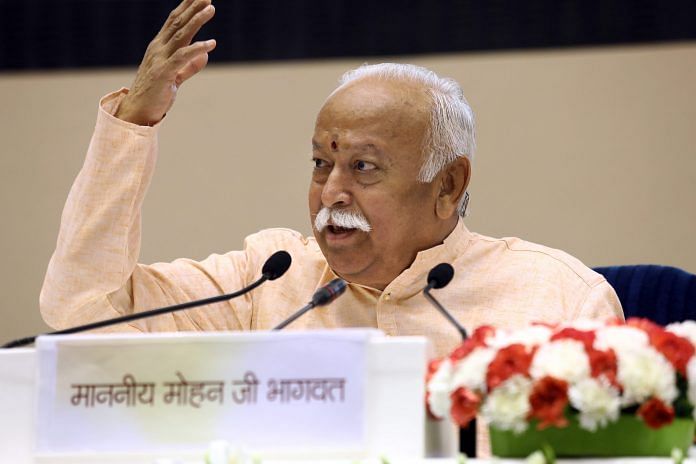Mohan Bhagwat’s speech is a clear indication that process of progressive evolution is still going on within RSS.
RSS chief Mohan Bhagwat’s lecture series this week has been the most significant event for the RSS since the 1974 speech by then chief Balasaheb Deoras.
Titled ‘Social Equality and Hindu Consolidation‘, Deoras’ speech had dispelled doubts about the RSS view on castes, Varna system and most importantly, on untouchability. After four decades, his speech is still considered the final words on these issues by the RSS.
The canvas of Bhagwat’s speech was much wider, and the ease with which he handled the topics, simplifying (without over-simplifying) demonstrates not only his superb communication skills, but also the clarity of mind and purpose. His speech was a combination of humour, anecdotes, passion, conviction and flexibility. He spent a significant time of his speech on the life of RSS founder K.B. Hedgewar, even as he stressed on the progressive evolution of the RSS right from its early days.
Also read: Deoras to Bhagwat- The evolution of RSS view on Muslims over the last 70 years
Then, Bhagwat gave the widest-ever definition of Hindutva by connecting it with values such as sacrifice, gratitude and patience, and not with religious faith. He categorically said that there is no disrespect for those who would like to use the word ‘Bharatiya’ instead of Hindutva. But at the same time, he stood firm on the concept of Hindutva.
On several contentious issues, he was upfront. He stood firm on building the Ram temple at the site of the birthplace of Ram in Ayodhya. He also talked about Article 370 and Article 35A, on gender equality and on the elimination of Section 377. He spoke at length on the participation of women in the RSS and its affiliates, reservations for SCs, STs and OBCs, deplored lynching in the name of cow protection and at the same time, strongly supported cow protection.
But his speech will long be remembered for the subtlety with which he touched upon several matters. In response to the question on why no Sangh pracharak is the organising secretary of any other political party except the BJP, Bhagwat simply said “because no other party demands it”. He explained the disadvantages of the NOTA option, nuances of implementing uniform civil code, decision-making processes within the RSS, commented on the concept of Swadeshi, to just name a few.
At the same time, he was very candid in accepting that the Sangh has a limited role in politics. That must be a disappointment for many. Bhagwat was bold enough to say that some sentiments in M.S. Golwalkar’s Bunch of Thoughts are out of sync with the current thinking within the RSS. This was a clear indication that the process of evolution and progress is still going on within the Sangh.
Also read: If you could please accept Hindu supremacy, RSS can become whatever you want it to be
The RSS is all about these subtleties. It has a nuanced approach to some issues and firm stand on others. The word “Hindu” has different connotations for the RSS, the Vishwa Hindu Parishad and the Hindu Swayamsevak Sangh (the overseas affiliate of the RSS). For the people who would like to see everything in black or white, it’s a difficult proposition to accept. At the same time, it is a difficult task for the Sangh to explain these distinctions in detail in today’s world that condenses all thoughts into 280 characters.
Similarly, Bhagwat’s elaboration on the swadeshi was not isolationist by any stretch of the imagination. By rejecting comments by one of the most revered personalities in the Sangh, Bhagwat has rightly differentiated between the temporal and eternal aspects of the Sangh’s thoughts. He has made clear that the Sangh is not a ‘closed system’, and kept options open for future generations to further fine tune his own utterances.
Neither Hindu society nor the Sangh are closed systems. External factors do influence us, both positively and negatively.
In his historic 1974 speech, Deoras made a curious observation: “We blame Muslim and Britishers for these rifts (between castes). They might have done few things… We could not have kept ourselves insulated from coming in contact with others. Would it have been possible for us to build a “Berlin wall” so as to avoid contacts with other nations, thoughts, cultures?… And who build such walls? Those who are not confident about themselves try to build the walls”
This is the real difference between other ideologically driven movements in India like Communism and the RSS. While the RSS is flexible enough to make changes without diluting core principles, closed systems like Communism remains caught in a time warp.
The core question is: where does the RSS draw its strength from (to rediscover itself every few years)?
First, the RSS is in a continuous dialogue with the outside world. There is an effective feedback system within the RSS that keeps the top leadership aware of ground realities. Second, RSS leaders are good listeners. Even bitter or negative feedback, if given with constructive intent, is always taken in a positive spirit. Third, is the collective decision-making process in the organisation.
Contrary to perception, there is not only an extensive discussion on every issue within the RSS, but it also takes added efforts to arrive at a consensus. Sometimes the RSS even defers decisions if a consensus is not readily available. It’s, therefore, not difficult to imagine that even before this series of speeches by the RSS chief, there must have been in-depth internal discussions on every aspect of the speech. That is the real strength of RSS, which many are not aware of.
Vijay Chauthaiwale is in-charge of the Bharatiya Janata Party’s foreign affairs department. The views expressed here are the author’s own.




V well explained in easy language what lay person wants to know
Congrats